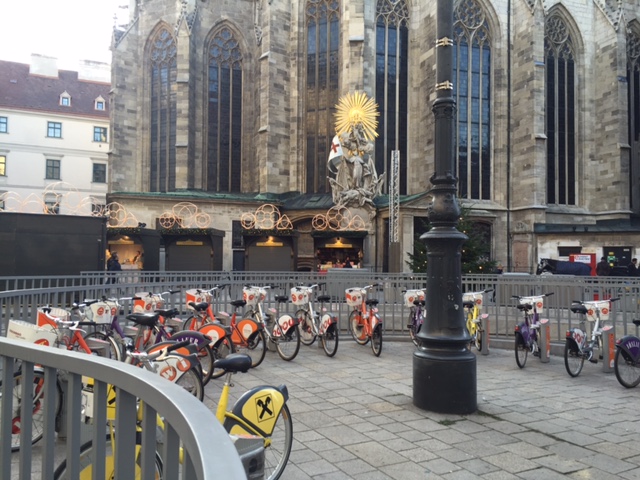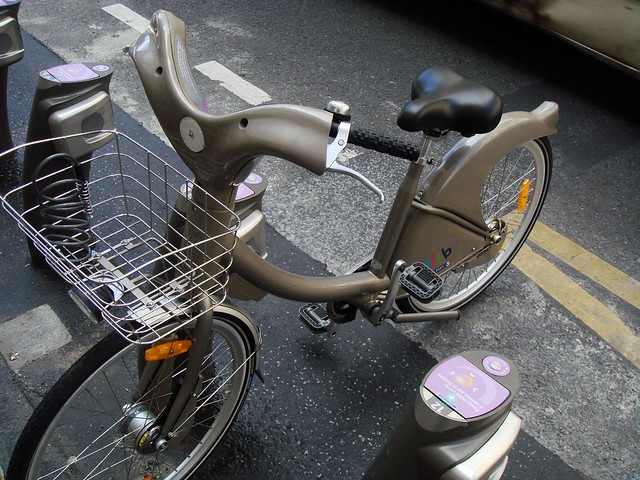
While visiting Vienna, Austria, I gave their CityBike Wien bike-share system a spin and found it has a couple of advantages over Chicago's Divvy system. CityBike Wien is dirt cheap, with a one-time registration fee of only one euro, about a dollar, compared to $9.95 for a Divvy day pass. And the first hour of every ride on CityBike Wien is free, while Divvy users start racking up late fees after the first 30 minutes. That means you can practically ride across the entire city of Vienna without having to re-dock your bike.
My experience with CityBike Wien made me think about what Divvy could do to improve user experience and encourage more ridership. Offering a longer period before late fees kick in might make the system more convenient to use, and there are several other possibilities for making the system more user-friendly.
Bike-share is generally designed for short trips and errands, especially "last-mile trips" between transit stations and other destinations. When Divvy bikes are used this way, 30 minutes is plenty of time. Moreover, customers can take longer rides without accruing late fees by "dock surfing," briefly checking in the bike at a station every half hour. If you have a membership key, this usually adds only a dozen seconds or so to your trip time.
On the other hand, there are other systems besides Vienna's that offer a longer free rental period than Divvy. For example, New York's Citi Bike and Paris' Vélib' allow annual members to use bikes for 45 minutes without late fees, although day pass holders can only use them for 30 minutes without extra fees.
So would it make sense to extend the Divvy rental period? Michelle Stenzel, co-leader of the grassroots group Bike Walk Lincoln Park, isn't convinced that's necessary.
“Although I don’t want to diminish the needs of users who truly want to ride a Divvy for 45 minutes…I have to ask whether those people have actually tried riding a Divvy for that long," Stenzel said. "Those bikes are heavy!” She added that she avoids using Divvy for more than 20-25 minutes at a time, but that's plenty of time for the kind of trips the system is intended for.
However, as the Divvy coverage area grows, customer may wish to take longer rides. This year the network expanded to 476 stations, covering 476 stations and 33 of Chicago's 50 wards, making it the largest system in North America based on the number of stations and the geographic area served. Next year, Divvy is adding 70 new stations in Chicago, Evanston and Oak Park next year, so the the coverage area will grow significantly.
But Jim Merrell, a campaign director at the Active Transportation Alliance doesn't think the larger service area will lead to a demand for a longer rental period. “Divvy’s great for the shorter trips, but I have a hard time seeing people using Divvy [for longer trips],” he said. He added that Divvy seems to be most useful for rides within neighborhoods, or when combined with transit. Still, longer rental times could make using Divvy a more relaxing experience by reducing the need to watch the clock and dock surf.

While you're supposed to only park Divvy bikes at the docking stations, that can detract from the usual "door-to-door" convenience of cycling. Stenzel mentioned seeing unlocked Divvy bikes outside of ATMs and retail establishments, which suggests that bike-share users didn't feel like docking the bikes and walking to their destinations while running errands. However, leaving a Divvy cycle unlocked is risky, because there's a $1,200 replacement fee for stolen or lost bikes.
Stenzel noted that Paris' Vélib' provides bike locks customers, which makes it more convenient to run errands. Perhaps this approach, combined with an extra 15 minutes of rental time, would broaden the appeal of Divvy.
Another improvement that could make Chicago's system more popular would be to outfit the bikes with more functional baskets, Stenzel said. The existing front racks aren't very useful for anything larger than a purse or a briefcase. Adding child seats to some bikes might be a nice addition as well, she said.
But Merrell said Divvy's top priority's should be expanding the system to neighborhoods that don't have bikes yet, and eventually increasing station density citywide, should be top priorities. "Alderman who don’t have Divvy in their wards yet want to know when the next round of expansion will be."
Stenzel and Merrell agreed that for Divvy to appeal to a broader demographic, the city needs to install more low-stress bikeways such as protected bike lanes, so that people don't have to pedal next to fast car traffic. "The most important thing that needs to be done to increase Divvy ridership is to make it less scary to bike in the city," Stenzel said. "We need to get beyond the set of bike riders who are ‘brave’ enough."
This post is made possible by a grant from the Illinois Bicycle Lawyers at Keating Law Offices, P.C., a Chicago, Illinois law firm committed to representing pedestrians and cyclists. The content is Streetsblog Chicago's own, and Keating Law Offices neither endorses the content nor exercises any editorial control.




